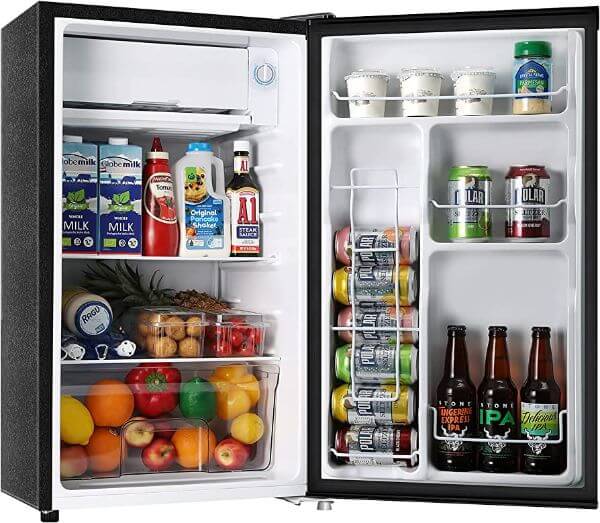When it comes to kitchen appliances, the terms “fridge” and “refrigerator” are often used interchangeably. However, understanding the subtle differences between these two terms can help you make an informed decision when purchasing or discussing your cooling needs.
In this blog post, we will dive into the nuances and distinctions between a fridge and a refrigerator, covering everything from definitions to functionality and beyond.
Definition and Origin
The term “refrigerator” is derived from the Latin word “refrigerare,” which means “to make cool.” It refers to a household appliance designed to store food and other perishable items at low temperatures, preserving their freshness. On the other hand, “fridge” is a colloquial term derived from the brand name “Frigidaire,” which gained popularity as a synonym for a refrigerator in many English-speaking countries.
Functionality and Features
Both fridges and refrigerators serve the same primary purpose of keeping food fresh and preventing spoilage. They achieve this through a combination of insulation, temperature control, and refrigeration technology. However, there are some variations in features and functionality between the two.
Refrigerators typically come with a separate freezer compartment, allowing you to store frozen items like meats, vegetables, and ice cream at lower temperatures. The freezer section may have its own temperature controls for optimal freezing conditions. Meanwhile, the main refrigeration section maintains a slightly higher temperature range for storing fresh produce, dairy products, and other perishables.
Fridges, on the other hand, often refer to compact refrigeration units that lack a separate freezer compartment. These appliances are commonly found in dorm rooms, offices, or as supplementary storage in garages or recreational areas. While fridges offer limited space compared to refrigerators, they still provide ample cooling capacity for keeping drinks, snacks, and a few perishable items fresh.
Size and Capacity
When considering the size and capacity of a fridge or refrigerator, it’s essential to assess your specific needs and available space. Refrigerators are available in various sizes, ranging from compact models suitable for small kitchens or apartments to larger models with ample storage capacity for large families or frequent entertainers.
Fridges, on the other hand, tend to be smaller and more compact. They are designed for convenience, fitting into tight spaces or serving as portable cooling options. While fridges may have limited storage space compared to refrigerators, they make up for it with their versatility and ability to be easily moved or relocated as needed.
Energy Efficiency
Energy efficiency is an essential factor to consider when choosing between a fridge and a refrigerator. With increasing awareness of environmental impact and rising energy costs, opting for an energy-efficient appliance can help reduce both your carbon footprint and utility bills.
Refrigerators, particularly newer models, often come with energy-saving features such as improved insulation, LED lighting, and advanced temperature control systems. Look for appliances with the ENERGY STAR label, indicating their compliance with energy-efficient standards.
Fridges, being smaller and generally used as secondary cooling units, tend to consume less energy compared to full-sized refrigerators. However, it is still advisable to choose energy-efficient models that minimize electricity usage and offer environmentally friendly operation.
Cost Considerations
Cost is an important aspect when weighing the pros and cons of a fridge versus a refrigerator. The price range for refrigerators can vary significantly depending on the size, brand, features, and energy efficiency. Larger refrigerators with advanced features will typically come with a higher price tag, while smaller, basic models may be more budget-friendly.
Fridges, being smaller and with fewer features, generally come at a lower price point compared to full-sized refrigerators. They offer a cost-effective solution for individuals or households with limited cooling needs or space constraints.
Consider Your Needs
When deciding between a fridge and a refrigerator, it’s crucial to assess your specific requirements. Ask yourself questions like:
- How much storage capacity do I need?
- Do I require a separate freezer compartment?
- What is the available space in my kitchen or desired location?
- Will the appliance be the primary cooling unit or a supplementary option?
- What is my budget for the purchase and long-term energy costs?
By considering these factors, you can make an informed decision that aligns with your lifestyle, space, and budgetary constraints.
Conclusion
In summary, the terms “fridge” and “refrigerator” are often used interchangeably, but there are important distinctions between the two. Refrigerators typically include both a refrigeration and freezer section, catering to larger storage needs, while fridges refer to compact cooling units without a separate freezer compartment, offering convenience and portability.
When deciding between a fridge and a refrigerator, carefully consider your storage requirements, available space, energy efficiency, and budget. Both options have their advantages and are suitable for different situations. Whether you choose a full-sized refrigerator or a smaller fridge, prioritize features like energy efficiency, temperature control, and durability to ensure long-term satisfaction with your purchase.
Remember to research and compare different brands and models, read customer reviews, and consult with professionals or retailers who can provide guidance based on your specific needs. Ultimately, selecting the right appliance will enhance your culinary experience, keep your food fresh, and contribute to the overall functionality and aesthetics of your kitchen.

